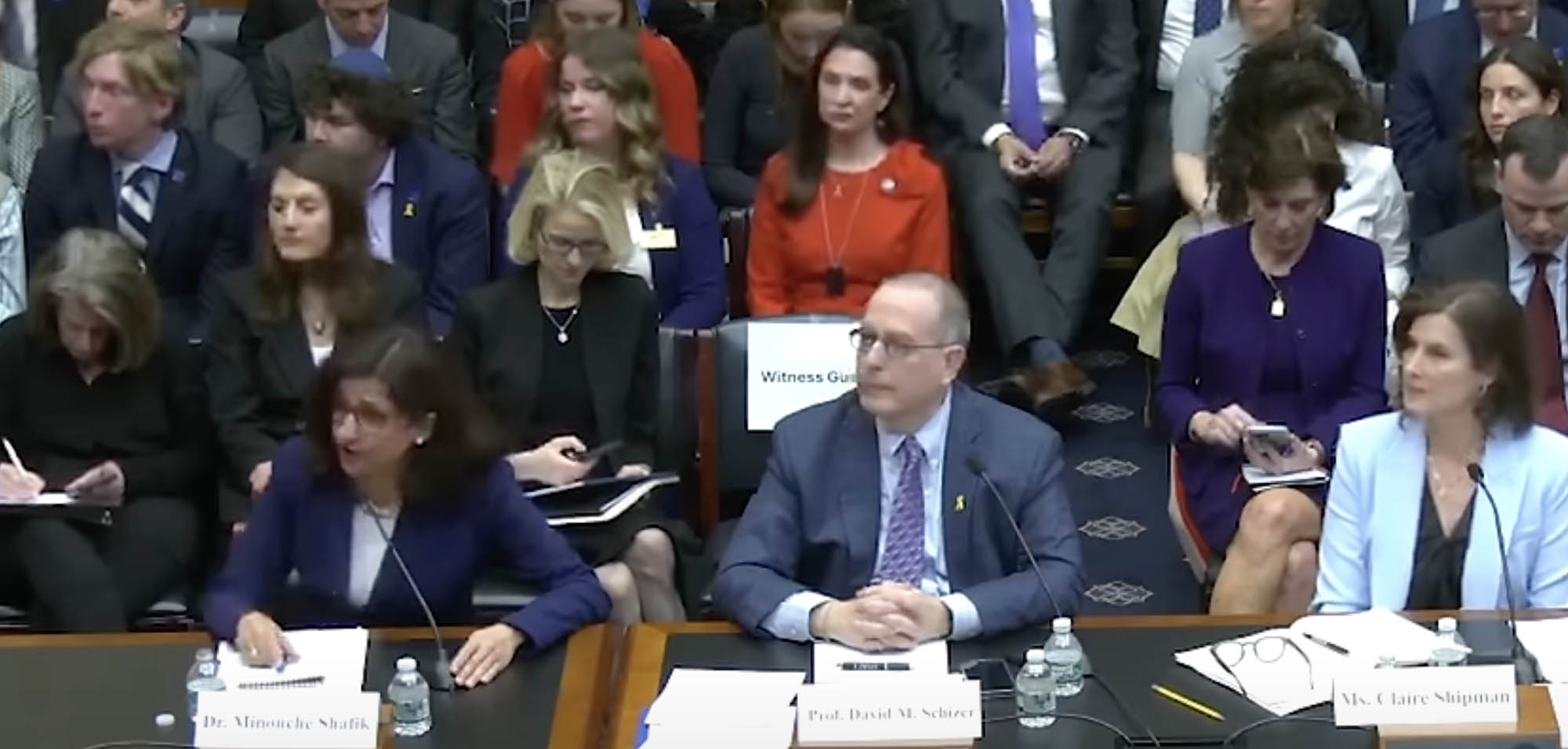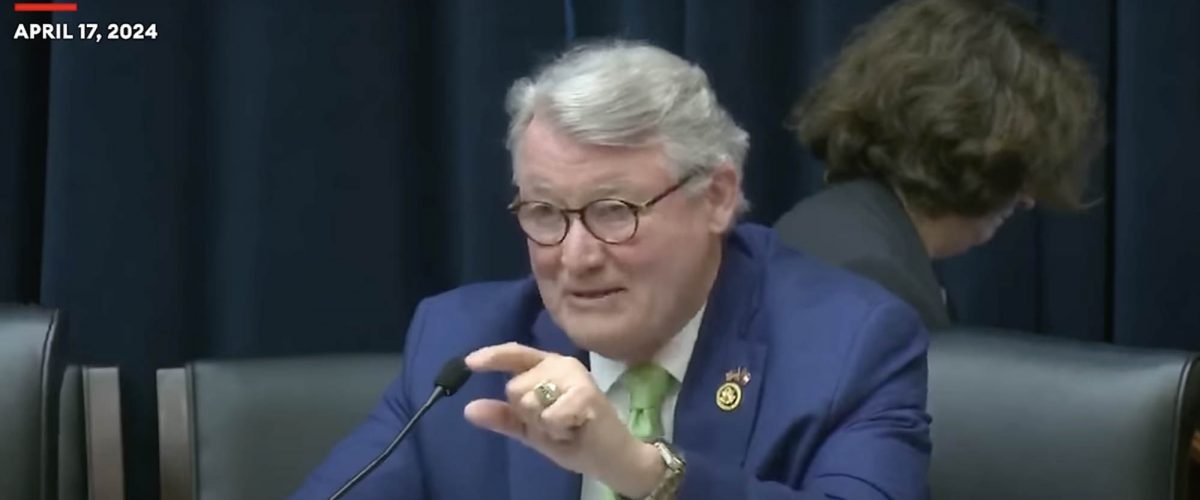America’s impasse over the dismal state of affairs in Gaza and Israel might have something to do with biblical illiteracy — even in Congress.
Two weeks ago, on April 17, the House Education Committee held a hearing on Columbia University’s response to alleged antisemitism on campus. There, Rep. Rick Allen (R-Ga.) questioned Columbia University President Minouche Shafik about the Bible with a speech that’s enough to make a Bible scholar squirm. Listening to Allen’s Christian nationalist harangue is almost unbearable.
“We’ve all been troubled by antisemitic activities occurring at your campus and around the country and around the world,” the Congressman begins. “As the most established democracy in the region, Israel exemplifies the core values of freedom and democracy. In fact, I tell my colleagues that Washington, D.C., is not the center of the universe; Jerusalem is the center of the universe.”

Columbia University President Minouche Shafik at the hearing (Screencap)
Then Allen, who is a member of a Global Methodist church, asks Shafik — born to Muslim parents in Egypt — about her knowledge of the Bible: “Are you familiar with Genesis 12:3?”
After she demurs, he begins his sermon: “Well, it’s pretty clear. It was the covenant that God made with Abraham, and that covenant was real clear. If you bless Israel, I will bless you. If you curse Israel, I will curse you. And then in the New Testament it was confirmed that all nations would be blessed through you.”
The Congressman then asks the university president: “Do you consider that a serious issue? I mean, do you want Columbia University to be cursed by God of the Bible?”
Shafik replies, “Definitely not.”
Then Allen launches into part two of his sermon: “OK, well, that’s good. So here’s the deal. We got freedom of speech in this country, freedom of religion, yet we also have Moses looking down on the entire body of Congress — who gave us the law (from) which most of our laws were made and are supposed to be enforced … and what we have today is a lawless land. We have lawless universities that are overrun by people who are threatening to kill other students, who are attacking other students and creating fear in this country. And we have a Constitution that requires us to treat other folks as we would like to be treated, which is also in the New Testament.”
“I mean, do you want Columbia University to be cursed by God of the Bible?”
Then he advises the Columbia president: “Maybe you should have a course and, you know, you don’t have to believe it but the Bible is an incredible history … (and) you need to know what’s in there. Maybe you should have a course suggested for those who are having problems with all of this on the Bible and what’s in the Bible and kind of what will happen if, you know, under the wrath of God. I mean, we have above the American flag in our chamber “In God We Trust.”
This goes on for the entire 5-minute allocation Allen has to speak.

Columbia University President Minouche Shafik (left) answering questions at the House hearing (screencap)
What’s wrong with this Congressional lecture? Let us count the problems.
First, the Georgia Congressman conflates the Constitution with the Bible. In fact, he assigns to the Constitution a biblical teaching — love your neighbor as yourself — that is found nowhere in the Constitution.
Second, Jerusalem is the center of the universe? The only explanation I can conjure for that belief is the dispensationalist belief that Jesus will return in glory to the Temple Mount. This simply makes no sense.
Third, Moses did not give us the Constitution. Allen seems to believe America’s founders copied and pasted the Mosaic Law from Hebrew Scriptures to create our Constitution. That’s just flat-out wrong. The Mosaic Law is much more stringent and specific than our Constitution.
Likely, Allen bases this belief on the erroneous assumption that America was founded as a “Christian nation.” It was not. And even if it were, drawing on the Mosaic Law would make us a “Jewish nation” rather than a Christian one.
Fourth, and most seriously, Allen makes an ancient blessing/curse motif of Hebrew Scriptures into a universal demand for today. He cites Genesis 12:3, which says, “I will bless those who bless you, and the one who curses you I will curse; and in you all the families of the earth shall be blessed.”
That’s God speaking to Abram, who isn’t even technically Jewish any more than Jesus was a Christian. He is Semitic in the broadest sense of the word. And this statement from God definitely is not about the modern-day state of Israel, which came to be thousands of years later.
Fifth, Allen illustrates the danger of the national motto — “In God We Trust” — that was adopted amid the Communist scare of 1956. That was not the motto of the founders. It is, instead, an ill-advised statement that feeds Christian nationalism.
Writing in Religion Dispatches, Chance Bonar of Tufts University explains: “Scholars of religion are in a crucial position in the midst of continued misunderstanding and mischaracterization of the Bible in both Congressional hearings and U.S. public discourse. Congress and universities are currently debating the boundaries of religious expression and the definitions of key terms in the field, including antisemitism, Islamophobia, (anti-)Zionism, and Israel (not to mention democracy, free speech, and open dialogue).”
“So much of the disagreement about current events in Gaza and Israel are driven by this kind of biblical illiteracy.”
So much of the disagreement about current events in Gaza and Israel are driven by this kind of biblical illiteracy. And by a lack of understanding of the very word “antisemitism.”
Allen and his Republican colleagues in the House took a crack at that one this week as well, passing a bill that redefines “antisemitism” in a way that even many American Jews believe is wrongheaded.
The Associated Press reports: “The House passed legislation Wednesday that would establish a broader definition of antisemitism for the Department of Education to enforce anti-discrimination laws, the latest response from lawmakers to a nationwide student protest movement over the Israel-Hamas war.”
This new definition borrows from the International Holocaust Remembrance Alliance’s definition of antisemitism, which says “targeting of the state of Israel, conceived as a Jewish collectivity” is antisemitism.
Rep. Jerry Nadler, D-N.Y., was among those opposing the bill: “Speech that is critical of Israel alone does not constitute unlawful discrimination. By encompassing purely political speech about Israel into Title VI’s ambit, the bill sweeps too broadly.”
The American Civil Liberties Union sent a letter to Congress urging members to vote against the legislation, explaining that federal law already prohibits antisemitic discrimination and harassment: “H.R. 6090 is therefore not needed to protect against antisemitic discrimination; instead, it would likely chill free speech of students on college campuses by incorrectly equating criticism of the Israeli government with antisemitism.”
Which takes us back to Columbia University — center of the most notable anti-Israel protests currently — and a host of other university campuses where students are attempting to call attention to the mass murder of 34,000 Palestinians by the state of Israel.
That genocide was not committed by “the Jewish people” but by the political state of Israel led by Prime Minister Benjamin Netanyahu.
“It is possible — and it is imperative — to critique the political state of Israel without being antisemitic or fearing the wrath of God.”
It is possible — and it is imperative — to critique the political state of Israel without being antisemitic or fearing the wrath of God.
What we have here is a theological problem that also appears to be a generational problem.
Also this week, I ran across a column on social media written by an old white man like me who scolded university students for not knowing as much about the Middle East as he does.
What the world does not need right now is more old white men lecturing university students about how stupid they are and what they obviously do not know about the Middle East. Old white men like me need to ask what it is students are saying we ought to hear.
Among Americans, the World War II generation seeks to protect the state of Israel at all costs and by any means necessary. By most accounts, this is what has driven President Joe Biden into the political corner where he now finds himself — a blind spot he didn’t see coming because of his generational perspective.
Younger adults, such as those who are university students today, are much more tuned to equal justice than their forebears. They have come of age in a world without borders — not a world with borders defined by the victors of a consequential world war.
Older Americans see criticizing the political state of Israel as antisemitism. Younger Americans see failing to protect all Semitic people as antisemitism. These two generations are working from different dictionaries. And guess who makes up the majority of Republican Congressmen? Older white men.
Yes, some of the student protests have gone too far, even though the majority have been orderly and peaceful. And yes, antisemitism is real and awful and must be called out. However, the law-and-order crowd looks upon students like they look upon Black people when vandalism erupts after a police-provoked racial incident. They paint all objectors with the same broad brush of thuggery.
Ironically, many of those who do not want students to have free speech rights are the very people who have been complaining that conservatives and Christians are not allowed free speech on university campuses.
Here’s the place where these religious zealots ought to take a lesson from Rep. Allen’s misplaced quote from Jesus: “Do unto others as you would have done unto you.” That’s from the Bible, by the way, not the Constitution.

Mark Wingfield
Mark Wingfield serves as executive director and publisher of Baptist News Global. He is the author of Honestly: Telling the Truth About the Bible and Ourselves and Why Churches Need to Talk About Sexuality.
Related articles:
What is going on at America’s elite universities? | Opinion by Mark Wingfield
Netanyahu has turned Israel into an evil empire | Opinion by Mark Wingfield
Netanyahu’s got to go but so do other obstacles to Mideast peace | Opinion by Erich Bridges


